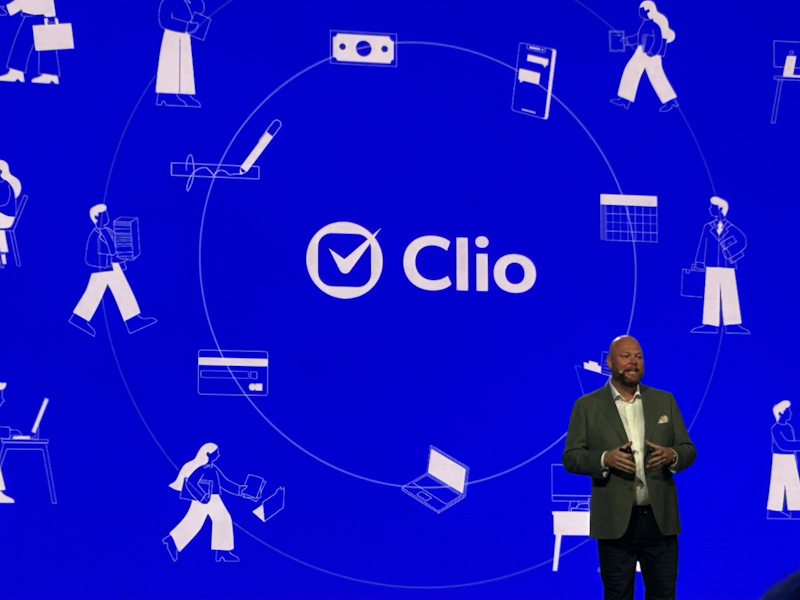With lawyers being less responsive to clients, Clio unveils new AI-productivity aid to help

Jack Newton, the CEO and founder of Clio, a legal technology company, speaks Monday during his morning keynote address at the 2024 Clio Cloud Conference in Austin, Texas. (Photo by Victor Li)
The adoption of generative artificial intelligence could allow lawyers to be more responsive and efficient at a time when they are anything but.
In his opening keynote Monday at the 12th annual Clio Cloud Conference, Jack Newton, the CEO and founder of Clio, a legal technology company, made clear that AI was here to stay and expressed pride that the legal industry was helping lead the way in adopting and integrating it into its practice.
Revealing findings from the company’s annual Legal Trends Report in an Oct. 7 press release, Newton announced that 79% of responding legal professionals were using AI, a drastic increase from 2023, when only 19% did so.
“I’ve never seen that in any other tech adoption cycle,” Newton said, pointing out that as the momentum of AI increased, it would allow law practices that adopted it to become more productive and efficient while crushing those that tried to stand in its way. “If you don’t embrace AI, you are at a fundamental competitive disadvantage, and you will lose.”
To help Clio users take advantage, Newton unveiled Clio Duo, a new AI-enabled productivity assistant designed to streamline and automate everyday tasks, such as billing, form generation, messaging, scheduling and workflow management. Clio Duo also uses AI to help summarize documents, contracts, agreements and filings while allowing lawyers and practices to communicate more easily with clients—potential and actual.
On that last point, Newton argued that Clio Duo could be especially helpful for lawyers to communicate more effectively and be more responsive to potential clients.
Reporting findings from the Legal Trends Report, Newton explained that Clio conducted a 2024 secret shopper study in which the company reached out to law firms, purportedly on a new client matter, to see whether they would respond. Of the 500 firms emailed, only one-third responded, a decrease from 2019, when 40% did so. The study also found that only 40% of firms answered calls, compared to 56% in 2019.
For the lawyers who did respond via email, 84% did so within eight hours. However, the report also found that only 18% were clear about what the next steps would be and how much it would cost. For phone responders, only 41% of firms gave out rate information, 12% offered cost estimates, and 36% took potential clients through what their next steps might look like. All in all, 73% were unlikely to recommend the firms that they contacted.
Newton noted that Clio Duo could help bridge that gap and easily generate business at a time when lawyers are spending nearly $2 billion on marketing. He also argued that it could help lawyers provide better service for a population in desperate need of legal assistance.
“We’re letting this demand stay unaddressed,” Newton said. “I think that’s irresponsible of us as a profession.”
Other findings from the report include an increase in flat fees, with firms charging 34% more of their cases on these arrangements compared to 2016. Clients also seem much happier with flat fees, with 71% preferring to use them over an entire case, and 51% liking them for individual tasks. The study also revealed that tech spending is up 20% annually, with solo practitioners leading the way with a 56% increase.
The conference, which runs through Tuesday, is taking place in Austin, Texas. According to Clio, which is also an advertiser with the ABA Journal, approximately 5,000 people are attending the show either in person or virtually.
Write a letter to the editor, share a story tip or update, or report an error.



